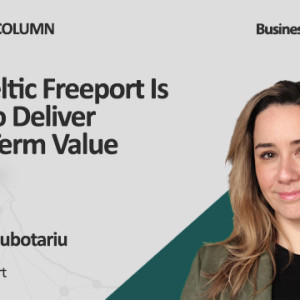The Celtic Freeport Is Built to Deliver Long-Term Value


The Celtic Freeport[1] is not just a tax-free zone. That's an important point. This is a targeted policy tool designed to drive productive investment -- and one that has been shaped to reflect the particular strengths, values and economic needs of Wales.
The freeport model offers a suite of investment and trade incentives, from business rates relief to customs easements. These are designed to support new investment, improve cash flow in the early years of operation, and make the difference on the margins where investment decisions are finely balanced. But the incentives are not automatic.
They are conditional, and businesses need to show that what they are doing is genuinely additional -- new activity that brings new jobs, new capacity or new capabilities. This is overseen through investment criteria and managed carefully to avoid economic displacement. What makes the Celtic Freeport[2] distinctive is its scale, flexibility and reach.
We span a large geography in South West Wales, bringing together two ports - Port Talbot and Milford Haven - each with different but complementary roles. Milford Haven is a centre of energy production, handling a significant proportion of UK energy imports. Port Talbot, meanwhile, has a high concentration of industrial energy users and off-takers.
The ability to connect energy production with energy demand gives us a unique strategic position in the UK's energy transition. But the Freeport isn't just about energy. It's about how we use the policy to support a more resilient and diversified economy.
From green steel and circular economy models to advanced manufacturing and floating offshore wind, our focus is on creating good jobs, transitioning existing industry and, ultimately, long-term prosperity. The incentives available through the Freeport can help unlock that investment -- not as an end in themselves, but as a starting point. Another strength lies in how the Celtic Freeport[3] has been designed.
This is a Welsh Freeport -- co-developed by the UK and Welsh Governments and aligned with the Well-being of Future Generations Act and Fair Work principles. That matters. It means that we are not only aiming for economic growth, but for growth that is sustainable, inclusive and long-lasting.
The Freeport is also a delivery mechanism for both government priorities, acting as a platform for wider regeneration. Wales has a further advantage: it is big enough to make a difference, but small enough to get things done. The connections between ports, local authorities, government and industry are close and practical.
That makes it easier to join the dots -- whether that's between investors and landowners, or between business needs and local planning processes. The freeport model is also designed to create a virtuous circle. Through the business rates holiday, we aim to attract new investment into designated sites.
Over time, once those rates are being paid, the revenues are retained locally and reinvested -- in infrastructure, connectivity, transport and skills. That reinvestment helps to create the conditions for further investment. It is a long-term approach to building local economic strength, not a short-term incentive package.
For those businesses operating just outside the designated tax sites, there are still ways to engage. The customs site model provides one such route. While legislation limits the number of tax sites, there is greater flexibility in the designation of customs sites within a specified radius from the Freeport, and we work with companies to explore whether that status could bring them meaningful benefit.
We also engage with local businesses who may not be directly eligible but can benefit through supply chain growth. Attracting new anchor companies often creates new opportunities for existing firms. What we are seeing on the ground now is a steady increase in interest -- both from international companies active in areas like floating offshore wind, hydrogen and carbon capture, and from UK-based firms looking to position themselves in new supply chains.
These businesses are carrying out due diligence, checking the suitability of land, infrastructure, connectivity and utility provision. They are also mindful of the lead-in times for planning and consenting, which can be significant. So while the interest is high, so too is the need for early and well-planned engagement.
Our role is to work with them to ensure that the freeport offer matches their business needs and that their investment plan aligns with the strategy of the Celtic Freeport[4]. It's not a one-size-fits-all approach. For some companies, this will be the right location.
For others, we will signpost to other parts of Wales or the UK. The goal is to grow the economy, and the freeport network as a whole benefits from that openness. We are not looking for short-term wins.
We are working with businesses to support long-term planning -- sometimes phased developments over several years -- and helping them navigate everything from planning applications to future infrastructure needs. This is a collaborative process. Their success is our success.
What I hope to see 20 years from now is not simply an increase in jobs or investment, but a transformed Welsh economy -- one that is more diverse, more resilient to external shocks, and able to offer opportunities for young people to stay, return or settle here. A place where people choose to live and work because the economic foundations are strong, and the future looks secure. That is the legacy I want the Celtic Freeport[5] to leave.
Luciana Ciubotariu talks about this and more in the Celtic Freeport[6]: Unlocking Opportunity podcast episode Inside the Incentives: Tax and Financial Benefits for Businesses in the Celtic Freeport[7]. Listen to the podcast here.[8]
References
- ^ Celtic Freeport - Homepage (businessnewswales.com)
- ^ Celtic Freeport - Homepage (businessnewswales.com)
- ^ Celtic Freeport - Homepage (businessnewswales.com)
- ^ Celtic Freeport - Homepage (businessnewswales.com)
- ^ Celtic Freeport - Homepage (businessnewswales.com)
- ^ Celtic Freeport - Homepage (businessnewswales.com)
- ^ Celtic Freeport - Homepage (businessnewswales.com)
- ^ Listen to the podcast here. (businessnewswales.com)